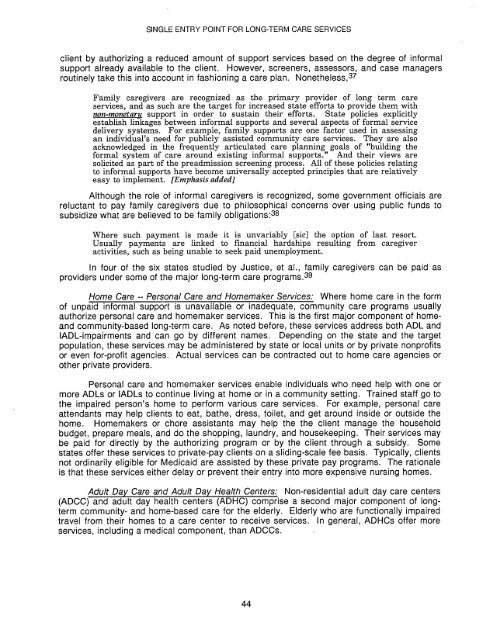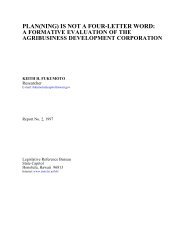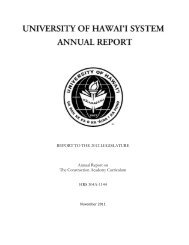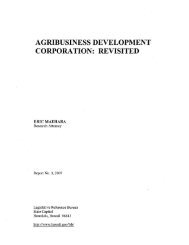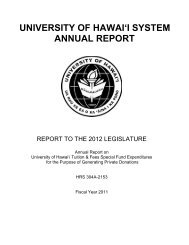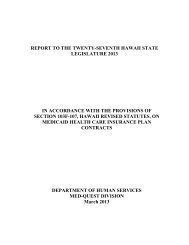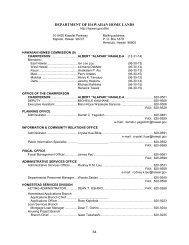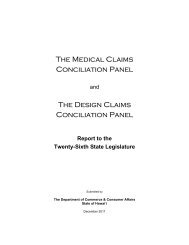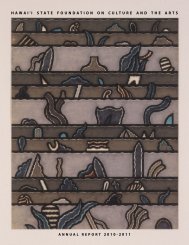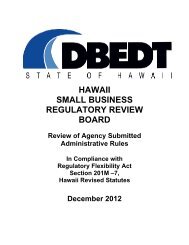long-term care - Legislative Reference Bureau
long-term care - Legislative Reference Bureau
long-term care - Legislative Reference Bureau
Create successful ePaper yourself
Turn your PDF publications into a flip-book with our unique Google optimized e-Paper software.
SINGLE ENTRY POINT FOR LONG-TERM CARE SERVICES<br />
client by authorizing a reduced amount of support services based on the degree of informal<br />
support already available to the client. However, screeners, assessors, and case managers<br />
routinely take this into account in fashioning a <strong>care</strong> plan. Nonetheless,3?<br />
Family <strong>care</strong>givers are recognized as the primary provider of <strong>long</strong> <strong>term</strong> <strong>care</strong><br />
services, and as such are the target for increased state efforts to provide them with<br />
non-monetary support in order to sustain their efforts. State policies explicitly<br />
establish linkages between informal supports and several aspects of formal service<br />
delivery systems. For example, family supports are one factor used in assessing<br />
an individual's need for publicly assisted community <strong>care</strong> services. They are also<br />
acknowledged in the frequently articulated <strong>care</strong> planning goals of "building the<br />
formal system of <strong>care</strong> around existing informal supports." And their views are<br />
solicited as part of the preadmission screening process. All of these policies relating<br />
to informal supports have become universally accepted principles that are relatively<br />
easy to implement. [Emphasis added]<br />
Although the role of informal <strong>care</strong>givers is recognized, some government officials are<br />
reluctant to pay family <strong>care</strong>givers due to philosophical concerns over using public funds to<br />
subsidize what are believed to be family obligations: 38<br />
Where such payment is made it is unvariably [sic] the option of last resort.<br />
Usually payments are linked to financial hardships resulting from <strong>care</strong>giver<br />
activities, such as being unable to seek paid unemployment.<br />
In four of the six states studied by Justice, et aI., family <strong>care</strong>givers can be paid as<br />
providers under some of the major <strong>long</strong>-<strong>term</strong> <strong>care</strong> programs. 39<br />
Home Care -- Personal Care and Homemaker Services: Where home <strong>care</strong> in the form<br />
of unpaid informal support is unavailable or inadequate, community <strong>care</strong> programs usually<br />
authorize personal <strong>care</strong> and homemaker services. This is the first major component of homeand<br />
community-based <strong>long</strong>-<strong>term</strong> <strong>care</strong>. As noted before, these services address both ADL and<br />
IADL-impairments and can go by different names. Depending on the state and the target<br />
population, these services may be administered by state or local units or by private non profits<br />
or even for-profit agencies. Actual services can be contracted out to home <strong>care</strong> agencies or<br />
other private providers.<br />
Personal <strong>care</strong> and homemaker services enable individuals who need help with one or<br />
more ADLs or IADLs to continue living at home or in a community setting. Trained staff go to<br />
the impaired person's home to perform various <strong>care</strong> services. For example, personal <strong>care</strong><br />
attendants may help clients to eat, bathe, dress, tOilet, and get around inside or outside the<br />
home. Homemakers or chore assistants may help the the client manage the household<br />
budget, prepare meals, and do the shopping, laundry, and housekeeping. Their services may<br />
be paid for directly by the authorizing program or by the client through a subsidy. Some<br />
states offer these services to private-pay clients on a sliding-scale fee basis. Typically, clients<br />
not ordinarily eligible for Medicaid are assisted by these private pay programs. The rationale<br />
is that these services either delay or prevent their entry into more expensive nursing homes.<br />
Adult Day Care and Adult Day Health Centers: Non-residential adult day <strong>care</strong> centers<br />
(ADCC) and adult day health centers (ADHC) comprise a second major component of <strong>long</strong><strong>term</strong><br />
community- and home-based <strong>care</strong> for the elderly. Elderly who are functionally impaired<br />
travel from their homes to a <strong>care</strong> center to receive services. In general, ADHCs offer more<br />
services, including a medical component, than ADCCs.<br />
44


